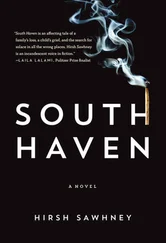With his free hand the punk was clawing at his own eyes, trying to wipe the gas out of them. Paul dropped the nozzle, which clattered to the ground next to the knife. He plucked the cigarette out of his mouth and held it close to the punk’s face. As the smoke drifted under the kid’s nose, he suddenly stopped struggling. “No, please, man, no,” was all he could mutter.
Paul didn’t hear him. Freak. The word echoed through his head, reverberating across every nerve. He inched the glowing tip of the cigarette closer to the punk’s gas-soaked face. A part of him knew that gas fumes are more flammable than the liquid itself but that part of him was submerged beneath a red ocean of rage. The one who had bullied Father McCarthy glanced at the knife then quickly back at Paul. Paul just shook his head and the boy suddenly became fascinated with his own Timberlands.
“Start walking,” Paul said calmly. When neither of the punks moved, he shouted, “Now!”
They both turned and began walking toward the road. Paul faced the fallen leader. He had managed to open his eyes, but they no longer showed the defiance and boldness of moments ago, only fear. Paul’s thin grasp on his anger faltered as he saw this. Now he was in control of the situation, but instead of relief he was being consumed with fury.
“You want to know what it feels like to look like this?”
His hand began to shake and move closer to the boy’s face. I’ve been out for less than two hours and I’m on my way back in. Paul glanced at the priest, his face shimmering through the gas fumes, and knew immediately what the man was thinking.
Father McCarthy had made the seventy mile trip to Braxton once a month for almost seventeen years, never doubting that Paul was innocent—until now. It was the look of doubt in the old man’s eyes that made Paul squeeze the cigarette out between his fingers. The punk slumped down lower against the car.
“If I hear of any trouble to my friend or the church, I’ll come looking for you. You pass that along to your girlfriends.”
The boy nodded anxiously, sending droplets of blood through the gas-soaked air.
“Get lost.” The punk staggered to his feet then stumbled toward an old Mustang parked by the Coke machine, one hand still clutching his bleeding cheek. Paul could see the attendant taking it all in from inside the station’s small office.
“Are you alright, Father?” Paul asked as he picked up the gas nozzle and the knife. He closed the blade and slipped it into his pocket.
The priest nodded.
“I guess that’s what you meant by the way things stay the same.”
“I don’t mean to make this any worse for you but I think the one you hit was Dale Crawford.”
Paul eyed the priest for a moment. “I suppose I don’t need to ask if he’s any relation to my good friend Officer Crawford.”
“Only son. And it’s Chief Crawford now.”
“I don’t know why I would have expected today to play out any differently.”
“Welcome home,” the priest said with a smile. Paul couldn’t help but smile back in spite of the gnawing feeling of dread that had overtaken him.
Spring had arrived in Haven, Massachusetts, and it promised to be a season in hell. The calendar claimed it was the first of May but the thermometer argued mid-August. For the third day in a row, the temperature broke ninety degrees, officially making it a heat wave according to the giddy local weathermen. Just two weeks ago, dirty mounds of snow were still scattered about the town from the infamous Blizzard of ’78 but that seemed as distant a memory as last year’s World Series. As distant and as forgettable as far as Dennis O’Brien was concerned. He hated winter, and to have it extended into spring was as painful as the Yankees winning it all. Denny looked up from his seventh grade history book as the old yellow school bus rattled from the pavement onto the dirt road that led to his house. Denny usually took advantage of being the last passenger by getting a head start on his homework, but the stale heat in the bus made it difficult to concentrate. Or maybe it’s the headache from Dale Crawford’s sucker punch, he thought. He absently rubbed the side of his head, thinking of the Charles Atlas ad he had seen in a comic book. He was tired of being the kid who gets sand kicked in his face.
The gears shrieked in protest as the bus crept up the steep hill, burping a cloud of blue smoke in its wake. The shimmering heat lent sharp contrast to the just-budding trees lining the road. Denny gathered his books as the weathered cape-style house came into view. He hurried off the bus, absently saying good-bye to the red faced driver known only as Stubby. Stubby nodded and mumbled unintelligibly through his cigar as he reached over to pull the lever to close the door. Denny made his way across the road as the bus turned around on the shoulder and headed back to town. As soon as the bus had passed, Denny was nearly knocked over by the greeting he received from his 6-year old black lab/retriever mix, Bear. The daily ritual never failed to make Denny smile, no matter how bad his day had been. Since he had started taking the bus, Bear would always be there waiting for his return from school to greet him with slobbering kisses.
Once in the house, Denny threw his books on the table in the hallway, glancing involuntarily at the spot above the table where the wallpaper was less faded than the rest. The spot was in the distinct shape of a cross. He entered the kitchen where Janice O’Brien stood at the counter peeling potatoes, surrendering not so much as a glance as her son entered the room. She was a tall woman and the weight she’d lost over the past couple of years had cut sharp angles to her figure and sharper lines on her once youthful face. Death had a way of doing that to people.
“Mom, I’m going to Billy’s for a while, and I’m taking Bear.” She looked at him as if she had never seen him before. The blank look always frightened Denny. What if she doesn’t know me? What if she never remembers me?
Then her eyes cleared and she answered, “Okay, be home in time for dinner.” She went back to peeling, satisfied the subject was closed.
Denny quickly changed into shorts and a t-shirt before heading out. By the time he walked the quarter-mile to the Cummings’ house, Billy would be getting home from baseball practice. He and Billy had been best friends for as long as Denny could remember. They made a good team: Denny the smarter, funnier of the two, Billy tougher and more confident. They had become inseparable. He ambled down the steep road with Bear, stopping occasionally to let Bear sniff around. Halfway down the hill, Denny called Bear over to his side and kept a close eye on him. Mrs. Lovell’s house was just up ahead.
Doris Lovell loved cats. She fed any stray that passed her way and of course they never left. The kids called her “Cat-woman.” Nobody really knew how many cats she had but Denny figured there to be close to a hundred. She kept no other pets and lived alone since her husband’s death. Denny didn’t like cats to begin with, but the number of them that Mrs. Lovell kept flat-out gave him the creeps. Even Bear seemed to sense something not-quite-right about so many cats together and tended to leave them alone. Sure enough, there were several of them roaming around the yard, sprawled in the driveway, sunning themselves on the fence—basically they were everywhere. Bear’s tail went down and he let out a low growl but he stayed right by Denny’s legs. As they passed the house, Denny could hear Mrs. Lovell’s voice but couldn’t make out what she was saying. He knew she was talking to the cats, though: he could tell by the sing-song tone, like she was talking to a child. The next house they passed was the old Greymore place, empty for years, but creepy nonetheless. The house crouched in the overgrown yard, hiding from the world behind washed-out shutters. The peeling paint was now some unrecognizable color and a gutter dangled from the edge of the roof, one strong gust away from impaling the tangle of shrubs below. Denny quickened his pace.
Читать дальше












